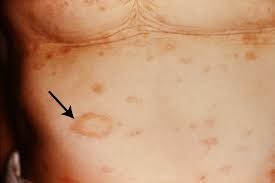
By Connie Colbert
Director, Canyon Health and Wellness Clinic
Pityriasis rosea is a scaly, reddish-pink skin rash. It is most common in people between the ages of 10 and 35. However, it can affect males and females of any age. The rash sometimes begins as a large spot on the chest, belly or back followed by a pattern of smaller lesions.

Symptoms
In most cases, pityriasis rosea begins with cold-like symptoms. These may include sore throat, fever, aches, nausea and fatigue. Then, a single, large spot may appear on your chest, stomach or back. This is called a “herald patch” or “mother patch.” It has a raised border and hollow center.
Smaller spots will continue to appear in the same area. The rash usually occurs at the natural folds of the back, chest and abdomen. The spots may be red, scaly and itchy.
Causes
Doctors don’t know the exact cause of pityriasis rosea. Some doctors believe that a viral infection can cause it. Certain medicines also may be the cause. Pityriasis rosea is not contagious, so people who have this rash cannot spread it to others.
How is it diagnosed?
Pityriasis rosea can look like other common skin rashes. Examples are eczema, ringworm and psoriasis. Your doctor will look for a herald patch and review your symptoms. A blood test or skin biopsy might be done to rule out other issues.
Can it be prevented or avoided?
You cannot prevent or avoid this condition.
Treatment
Treatment cannot cure pityriasis rosea, but medicine can help relieve the itching. Your doctor may suggest antihistamine pills, such as Benadryl. Steroid cream, calamine lotion or zinc oxide cream also can relieve the itching. Some people may need to take steroid pills to clear up their rash.
Let your doctor know if you are pregnant. This may affect your treatment options and require more in-depth monitoring.
Living with Pityriasis Rosea
In most cases, pityriasis rosea goes away on its own and does not come back. It could last one to three months. Heat can worsen the rash and itching. Try to avoid hot water and temperatures.
Contact your doctor if the rash lasts longer than three months.



